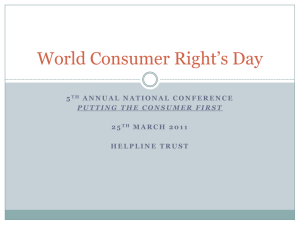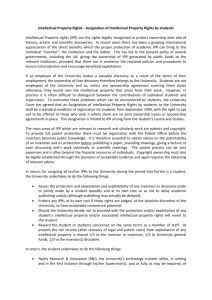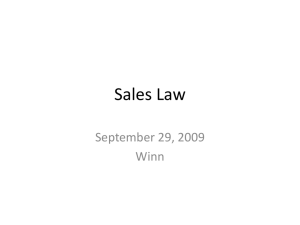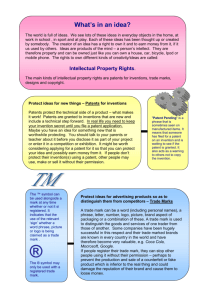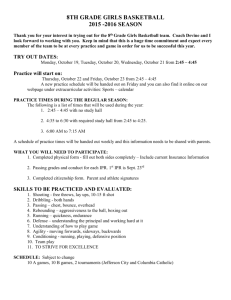Professional Issues
advertisement
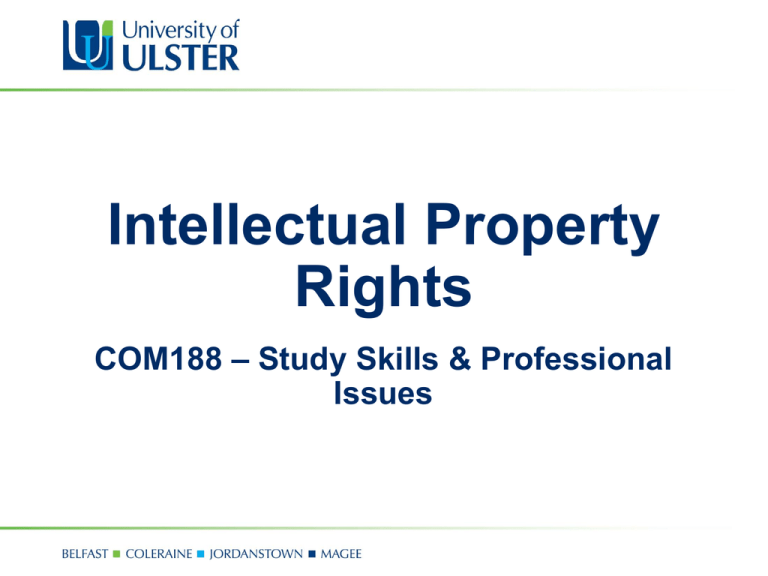
Intellectual Property Rights COM188 – Study Skills & Professional Issues Intellectual Property Rights Intellectual Property Allows individuals to own their creativity and innovation in the same way that they can own physical property. Intellectual Property Rights (IPR) are your rights to use and protect your intellectual property Due diligence IP owners should search with due diligence to ensure they have exclusive ownership of a novel idea before proceeding Intellectual Property Rights Intellectual Property Rights are the most valuable assets owned, used and developed by a company. IPR Includes: Confidential Information Patents Trademarks Designs Copyrights IPR – Confidential Information Confidential Information “Information which is not public property and public knowledge” [Greene 1948] This definition encompasses potentially any category of information (i.e. Personal Confidences, trade secrets, sensitive government information, any or all of which an IT professional might handle in the course of his work, etc.) IPR – Confidential Information Three conditions must be satisfied before an action for breach of confidence can succeed: 1. 2. 3. The Information must be confidential The information must have been disclosed in circumstance which give rise to an obligation of confidence There must be an actual or anticipated unauthorized use or disclosure of the information. The action used to prevent breach of confidence is a civil one IPR – Patents A patent for an invention is granted by government to the inventor, giving the inventor the right for a limited period to stop others from making, using or selling the invention without the permission of the inventor. When a patent is granted, the invention becomes the property of the inventor, which - like any other form of property or business asset - can be bought, sold, rented or hired. IPR – Patents Patents are territorial rights; UK Patent will only give the holder rights within the United Kingdom and rights to stop others from importing the patented products into the United Kingdom. http://www.ipo.gov.uk/whatis.htm IPR - Patents Patents are given to Inventions that satisfies a number of criteria set by the Patents Act (1977). The invention is new; It involves an inventive step It is capable of industrial application The subject matter of the invention does not fall within an excluded class. IPR - Patents The Invention must be new: The invention must not have been disclosed or used publicly before the date of filing the patent application. When discussing the invention with others, the confidentiality of the information should be stressed. IPR - Patents The Inventive Step More difficult to define. The advance claimed in the patent specification must not be obvious as anything that is obvious is already on the public domain and not novel. IPR – Patents Capable of Industrial Application The invention MUST have a practical application or in other words, it must have a technical effect. IPR – Patents What is not patentable? An invention is not patentable if it is: a discovery; a scientific theory or mathematical method; an aesthetic creation such as a literary, dramatic or artistic work; a scheme or method for performing a mental act, playing a game or doing business; the presentation of information, or a computer program. IPR – Patents If the invention involves more than these abstract aspects so that it has physical features (such as a special apparatus to play a new game) then it may be patentable. In addition, it is not possible to get a patent for an invention if it is a new animal or plant variety; a method of treatment of the human or animal body by surgery or therapy; or a method of diagnosis. More Info: http://www.ipo.gov.uk/patent.htm Software Patents Allowable now in the Europe A computer program was not excluded from patentability if it produced, or was capable of producing, a further technical effect beyond the normal physical interaction between software and hardware IBM/Computer Programs No.96305851.6 (1999) http://www.epo.org/index.html Software Patents – US Example “A method of placing an order for an item comprising: Under the control of a client system, - displaying information identifying the item and - in response to only a single action being performed, sending a request to order the item along with an identifier of a purchaser of the item to a server system, under control of a single-action ordering component of the server system - receiving the request - retrieving additional information previously stored for the purchaser identified by the identifier in the received request and - generating an order to purchase the requested item for the purchaser identified by the identifier in the received request using the retrieved additional information and - fulfilling the generated order to complete purchase of the item whereby the item is ordered without using a shopping cart ordering model” US Patent No 5960411: Amazon “One Click” IPR – Trademarks Definition found in the Trade Marks Act 1994: A trade mark is any sign which can distinguish the goods and services of one trader from those of another. A sign includes, for example, words, logos, pictures, or a combination of these. IPR – Trademarks Basically, a trade mark is a badge of origin, used so that customers can recognise the product of a particular trader. To be registrable your trade mark must be: distinctive for the goods or services which you are applying to register it for, and not deceptive, or contrary to law or morality, and not similar or identical to any earlier marks for the same or similar goods or services. IPR – Design Rights A registered design is a monopoly right for the appearance of the whole or a part of a product resulting from the features of, in particular, the: Lines Contours Colours Shape Texture Materials of the product or its ornamentation. IPR – Design Rights To qualify for registration, your design must: 1. be new which means that it must not be the same as any design which has already been made available to the public, And 2.have individual character which means that the overall impression it produces on an informed user of the design must differ from the overall impression produced on such a user by any design which has already been made available to the public. In assessing individual character, we take into account the degree of freedom of the designer in creating the design. IPR – Design Rights IPR office cannot register designs which are: concerned only with how a product works, or for parts of complex products that are not visible in normal use, or contrary to law or morality. Registration can last for a maximum of 25 years and is a property that, like any other business commodity, may be bought, sold, or licensed. A registered design is additional to any design right or copyright protection that may exist automatically in the design. IPR Example To all whom it may concern: Be it known that I, Walter E. Disney, a citizen of the United States, residing at Los Angeles, in the county of Los Angeles and State of California, have invented a new, original, and ornamental Design for a Toy or Similar Article, of which the following is a specification, reference being had to the accompanying drawing, forming part thereof. Fig. 1 of the drawing is a front elevation of the my new design, Fig. 2 is a back elevation showing my improved design, and Fig. 3 is a plan view of the toy design embodied in this invention. I claim: The ornamental design for a toy or similar article substantially as shown. IPR Example IPR Example Patent – ring pull Confidential information – recipe, ingredients Trade Mark – Coke brand Design – Colour, artwork Additional Info and Reading On Contracts and IPR BOTT, F. et.al (2001) “Professional Issues in Software Engineering”, Taylor and Francis, London. Chapters 5 and 6 http://www.ipo.gov.uk/patent.htm http://www.ipo.gov.uk/whatis.htm http://www.epo.org/index.html
